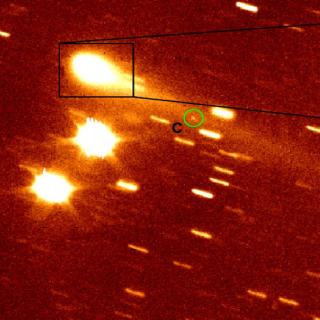Bibcode
Campins, Humberto; Hargrove, Kelsey; Pinilla-Alonso, Noemi; Howell, Ellen S.; Kelley, Michael S.; Licandro, J.; Mothé-Diniz, T.; Fernández, Y.; Ziffer, Julie
Bibliographical reference
Nature, Volume 464, Issue 7293, pp. 1320-1321 (2010).
Advertised on:
4
2010
Journal
Citations
269
Refereed citations
248
Description
It has been suggested that Earth's current supply of water was delivered
by asteroids, some time after the collision that produced the Moon
(which would have vaporized any of the pre-existing water). So far, no
measurements of water ice on asteroids have been made, but its presence
has been inferred from the comet-like activity of several small
asteroids, including two members of the Themis dynamical family. Here we
report infrared spectra of the asteroid 24 Themis which show that ice
and organic compounds are not only present on its surface but also
prevalent. Infrared spectral differences between it and other asteroids
make 24 Themis unique so far, and our identification of ice and organics
agrees with independent results that rule out other compounds as
possible sources of the observed spectral structure. The widespread
presence of surface ice on 24 Themis is somewhat unexpected because of
the relatively short lifetime of exposed ice at this distance (~3.2AU)
from the Sun. Nevertheless, there are several plausible sources, such as
a subsurface reservoir that brings water to the surface through `impact
gardening' and/or sublimation.
Related projects

Small Bodies of the Solar System
This project studies the physical and compositional properties of the so-called minor bodies of the Solar System, that includes asteroids, icy objects, and comets. Of special interest are the trans-neptunian objects (TNOs), including those considered the most distant objects detected so far (Extreme-TNOs or ETNOs); the comets and the comet-asteroid
Julia de
León Cruz